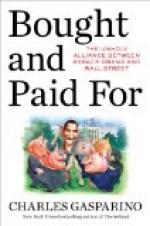Her husband entered, attired in a heavy overcoat, the collar of which was turned up. His nose was blue, his eyes red and he was shivering with cold.
“Gee! but it’s tough weather, all right!”
Taking off his overcoat and muffler, and placing them on a chair together with his lunch box, he crossed the room to the radiator to warm his hands. Fanny, still fuming, went to the baby carriage, folded the blanket and arranged the cushions. Angrily she exclaimed:
“Is that why you must ring the bell and wake the baby when you have the key? Don’t you think I’ve got enough to do running this flat and cooking for three people and looking after the baby without having to go and open the door for you? Why didn’t you open it yourself?”
Her husband looked at her in a stupid kind of way. With a grin he said:
“Well, if you must know, I’ve lost my key.”
“Lost your key?”
“Yes.”
“Don’t you know that keys cost twenty-five cents apiece?”
“Sure I do.”
“Well,” she went on indignantly, “you want to remember that every quarter—yes, and every nickel—counts these days. You’re not working for Mr. Stafford at a hundred a week now; you’re a shipping clerk getting thirteen per! Not even fourteen—thirteen!”
Her husband squirmed. Shifting his feet uneasily he muttered
“You needn’t rub it in.”
Fanny held out her hand.
“Hand it over,” she commanded.
“What?”
“The thirteen,” she said determinedly. “This is pay day. Come on!—come on!—come on!” she ordered, going up to him threateningly.
With a grimace, he thrust his hand in his trousers’ pocket and bringing out a small roll of bills, handed it to his wife. She counted the money carefully, and then stuffed it inside her dress. He watched her, a comic expression of resignation on his face.
“Don’t I get any?” he grumbled.
“Yes,” she answered quickly, “you get carfare and cigar money—twenty cents a day and you get it each day—”
Saying this, she turned her back and fastening on her apron, made a move towards the kitchen. Jimmie, with a gesture of disgust, threw his lunch box on the table and dropped into a chair.
“Can’t I even have lunch money” he growled.
Fanny turned on him like a tigress. For some time he had been getting on her nerves and to-day she was in just the humor to let out what she felt. Angrily she exclaimed:
“Won’t you ever get it into your head that I’m running this flat on eighteen dollars a week—thirteen from you and five from Virginia? Lunch money! You’re lucky even to get lunch!”
He made no reply, but lapsed into a sulky silence. Presently, with a wry face, he growled:
“I’m getting tired of nothing but dry sandwiches and dill pickles.”
“What do you expect for thirteen per?” she retorted, “terrapin or pate de fois gras? Getting tired of—”




